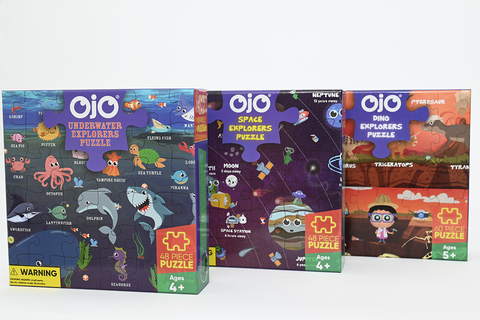Tuesday, April 5th, 2022
It’s unlikely you will find a home that doesn’t have a jigsaw puzzle in it, especially if young children live there. Most of us probably never even give them a second thought, there are just there, a traditional toy that we have all played with. However, did you realise that while children are playing with a jigsaw, not only are they having fun but they’re developing a range of skills which can significantly impact learning in a very positive way.
Here's 10 benefits of jigsaw puzzles for children
1. Fine Motor Skills
Playing with puzzles helps children develop fine motor skills, through the coordination of small muscles. Picking up, holding and manipulating pieces of a puzzle will help them developed the fine motor skills needed for children to write successfully, to be able to draw or learn to play an instrument.
2. Hand and Eye Coordination
Playing with a jigsaw is particularly effective at helping young children with their hand and eye coordination. To solve a puzzle, pieces must be correctly identified and placed in the correct position, before placing a piece the child has to see where it will go with their eyes and use their hand to move it to that exact spot. Being encouraged to do this independently makes the process even more beneficial.
3. Spatial Awareness
While solving a jigsaw, spatial awareness comes into play big time! This involves understanding how the relationships between objects change when one or more of them is moved. Children learn to identify which pieces will fit by analysing shape and colour, over time they learn to do this in their heads rather than by trial and error. Clinical trials have proved that by working out how smaller pieces fit into the bigger picture children develop their skills of movement, depth and distance perception - known to neurologists as visuospatial functioning.
4. Shape Recognition
Even simple puzzles help children develop shape recognition, as they learn to identify the properties that make shapes unique. This skill helps children learn both letters and numbers, how can children recognise the letter ‘A’ unless there are able. To recognise shapes in general.
5. Critical Thinking, Reasoning Skills and Problem Solving
There is only one way to be successful with a puzzle so a child needs to be able to use critical thinking, reasoning skills and problem solving, to complete it. All skills which are invaluable in later life. Building puzzles helps children to develop strategies for success such as breaking down large tasks into smaller more manageable one.
6. Short-term Memory
Jigsaw puzzles are a really good way to reinforce existing connections between our brain cells as they keep the child’s mind active and engaged, therefore improving our short-term memory.
7. Confident and Determined
The regular use of puzzles helps children to become more confident and determined, by seeing their persistence pay off. This gives them a great sense of achievement once the puzzle is complete.
8. Subliminal Learning
Jigsaws are available in a huge range of topics, from farm animals, maps and the solar system and they are very effective in arousing children’s interest. Themed puzzled let parents make a selection of puzzles that will most benefit their child. Playing with puzzles in this a way helps with the acquisition of knowledge through subliminal learning.
9. Valuable Life Skills
By building a jigsaw together with a sibling, a friend or family member a child is developing and practicing valuable life skills, such as communication, sharing, turn taking and being part of a team.
10. Fun
Playing with puzzles is great fun!

OjO has just released a range of science puzzles; Underwater Explorers, Space Explorers and Dino Explorers. As well as all the benefits listed above, they are also educational so your child can learn whilst having fun at the same time!
Contributed by Educator, Christine Havercroft




Leave a comment